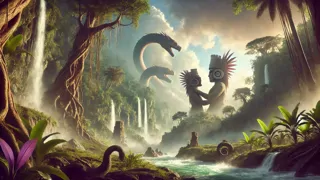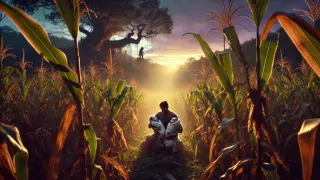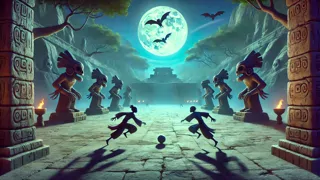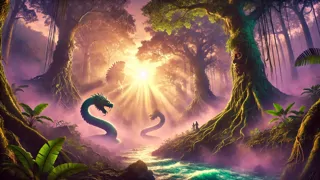Introduction
In the ancient land of the K’iche’ Maya, beneath emerald canopies that shimmered with dew and birdsong, the world waited in shadow. Long before cities rose, before maize ripened under the sun, there existed only the restless stirrings of creation, echoing through dense jungles and stone-strewn rivers. This was an era unbound by time, a dawn when gods conversed in whispers and the first hopes for humankind took shape in their minds. Amid this sacred darkness, the universe was a blank canvas, yearning for color, sound, and story. The creators—Heart of Sky, Sovereign Plumed Serpent, and their celestial kin—pondered how to bring forth life worthy of reverence, beings who might speak their names and honor the web of nature.
Yet, creation is never a simple act. The gods’ earliest attempts summoned animals and tried men of mud and wood, only to find these forms lacking—silent, forgetful, or simply unable to praise. Each failure echoed through the deep, stirring both patience and frustration in the divine assembly. Through trial and destruction, the cosmos learned its lessons.
It was in this world—newborn, vulnerable, yet brimming with potential—that the destinies of two brothers, Hunahpu and Xbalanque, would be written. Born of a mother’s sorrow and a father’s sacrifice, the Hero Twins would grow to challenge the lords of death, venturing where no living soul dared tread. Their journey was one of wit and bravery, marked by riddles and transformation, shadow and sun. Their tale, passed down for centuries in whispered recitations and woven into the stones of lost cities, remains the heartbeat of Maya legend.
What follows is the epic of beginnings: the forging of earth and sky, the rise and fall of false creations, and the ultimate test of courage and cunning in the underworld’s darkest halls. Through the Hero Twins’ trials, the world is shaped anew—and the dawn breaks at last for humankind.
The Shaping of the World: Creation, Destruction, and the First Beings
In the unfathomable silence before time, only the sea and the sky existed—vast, infinite, empty. Heart of Sky, also known as Huracán, drifted above the abyss, his voice rolling like thunder. Beside him moved Sovereign Plumed Serpent, whose thoughts glided as easily as water slips over stone. In perfect union, they spoke the first words of power: “Let there be earth.” Their command rippled through the void, and land rose up, lush and alive, from churning waters. Mountains breached the surface, cloaked in mist; valleys unfurled like green carpets, eager to cradle the seeds of life.

Yet, the world was still silent. Eager to fill it with sound, the gods called forth animals: deer and jaguars, birds of radiant color, serpents that slithered among roots. But when the gods asked these creatures to praise them, there was only the call of the toucan or the yowl of the ocelot—beautiful, but empty of meaning. The animals could not form the words the gods longed to hear. Disappointed, Heart of Sky and Plumed Serpent decided that other beings must be tried.
The first men were fashioned of soft mud. The gods shaped their arms and legs, pressed faces into wet clay, and breathed life into their fragile forms. These mud people moved and blinked, but they could not stand strong nor speak clearly. Rain dissolved them, and they melted back into the earth. The creators mourned their failure but would not surrender. Together, they summoned their power again, this time carving men from carved wood. These wooden people walked upright; they multiplied, built houses, and spread across the land. Still, they lacked souls. They did not remember their makers nor offer gratitude. Their bodies were hollow, their voices empty. Angered by this forgetfulness, the gods sent a deluge to erase them—floods, jaguars, and fire scouring away the unworthy creation. Only a handful of survivors, now transformed into monkeys, lingered in the treetops, a reminder of divine disappointment.
It was at this point—after destruction had swept the land—that a new hope emerged. Heart of Sky and Plumed Serpent called a council with the wise spirit beings: Xpiyacoc and Xmucane, the Grandmother and Grandfather. Together they pondered the riddle: what could bring forth people with hearts and voices, able to cherish the world and the gods who gave it? The answer came with maize, the sacred grain. From its golden meal, they shaped four new beings—Jaguar Quitze, Jaguar Night, Mahucutah, and True Jaguar. These men were strong and wise, able to speak, to remember, to honor their creators. Their vision was so keen that they could see far and wide, almost rivaling the gods themselves.
But the gods grew uneasy. Mortals should not know all; some mystery must remain. So, Heart of Sky breathed upon their eyes, clouding them just enough to make them human—to make them dream and wonder. At last, creation was complete. The world throbbed with life, praise echoing from mountains to sea. Yet, deep beneath this surface harmony, ancient stories whispered of an unfinished task—a balance to be restored in the shadowed world below.
Of Bloodlines and Sacrifice: The Birth of the Hero Twins
Far from the sunlit world, in the deep shadow of Xibalba—the Maya underworld—a different kind of story was unfolding. Here, death was not an end but a kingdom ruled by cunning and cruelty. The Lords of Xibalba delighted in trials of pain and trickery, their palace a labyrinth of darkness and dread. Into this realm, fate sent two brothers: Hun Hunahpu and Vucub Hunahpu, great ballplayers whose laughter and shouts rang out even in the gloom above.

Their skill drew the attention—and ire—of the Lords of Xibalba, who despised joy in any form. Through messengers of bone and bat wing, they summoned the brothers to a contest in the underworld’s deadly ballcourt. Clever traps awaited them: razors embedded in walls, halls reeking of scorpions and shrieking bats. The brothers faltered and fell to the lords’ tricks. Hun Hunahpu’s head was cut from his body and hung in a calabash tree. Yet, death could not silence destiny.
One day, Ixquic, daughter of a Xibalban lord, wandered beneath the calabash tree. Hun Hunahpu’s skull, now sprouting leaves, spoke to her in riddles. When she reached for its fruit, a drop of essence fell onto her palm—life passing from father to daughter, hope blossoming where only shadows had ruled. Fleeing her father’s wrath, Ixquic ascended to the surface, where she found sanctuary with Xmucane, the wise Grandmother.
There, among tangled maize fields and humble huts, Ixquic gave birth to twins—Hunahpu and Xbalanque. Their childhood was fraught with hardship and mischief. Their jealous older brothers despised them, seeking every opportunity to humiliate or banish them. Yet the twins proved clever and resourceful, outwitting their siblings through trickery and transformation. They coaxed corn from barren earth, summoned animals with their flute music, and earned the grudging love of their grandmother.
But the shadow of Xibalba loomed ever closer. When their elder brothers plotted to destroy them, Hunahpu and Xbalanque turned disaster into triumph—using wit to best their rivals and restore balance to their family. Each trial was a lesson: in patience, humility, and courage. The twins’ true purpose, however, was not yet revealed. Deep within them stirred the legacy of sacrifice, a fire inherited from their father’s fate. When at last word reached them that Xibalba had challenged them—summoning them to the same deadly ballcourt that had claimed their father—their destiny called. Armed with cunning and courage, Hunahpu and Xbalanque set out for the underworld, hearts pounding, shadows gathering at their heels.
Descent into Xibalba: The Hero Twins Triumph Over Death
The path to Xibalba was fraught with deception—hidden rivers of scorpions, crossroads where voices whispered lies, and trick stairways that led nowhere. Hunahpu and Xbalanque pressed on, their hearts steadied by memory and resolve. When they reached the threshold of the underworld, they found the lords waiting: One Death and Seven Death, surrounded by lesser demons with names like Bloody Teeth and Bone Scepter. The lords’ court was a place of mockery and illusion, where even a handshake could spell doom.

The twins, however, would not be fooled so easily. When offered seats upon burning stones, they recognized the trap and refused. When commanded to greet the lords, they saw through the decoys—wooden mannequins dressed as kings—and bowed only to the true rulers. Each trial sharpened their wits and tested their unity.
In the House of Gloom, they endured endless night; in the House of Blades, they dodged whirling knives; in the House of Cold, they huddled together as frost bit at their skin. In the House of Jaguars, they tamed the beasts by offering bones; in the House of Bats, they crouched low as leathery wings swept above. It was in this chamber that disaster nearly struck. A bat lord, Camazotz, struck out at night, severing Hunahpu’s head. The lords seized it and used it as a ball for their game.
But Xbalanque would not despair. Relying on cleverness, he summoned creatures of the forest—a rabbit to trick the lords with a decoy ball. In the confusion, he retrieved his brother’s head and restored him to life. The twins took to the ballcourt once more, their movements a dance of defiance and destiny. At last, realizing brute strength would not win the day, they turned to magic.
They offered themselves up, asking the lords to sacrifice them. The lords agreed, burning their bodies and scattering their ashes into a river. But even death could not hold them. Transformed into catfish, then radiant boys, they returned to Xibalba in disguise. There they performed miracles: setting fires that burned without heat, resurrecting one another with a wave of their hands. The lords, greedy for power, demanded the secret of this magic. The twins obliged—turning the trick against their tormentors, they sacrificed the lords but did not revive them.
With Xibalba defeated, Hunahpu and Xbalanque ascended from the underworld’s gloom. One became the sun, the other the moon—eternal reminders of the victory of wit and courage over darkness. Their journey sealed the balance of creation and ensured that humanity would rise beneath their watchful gaze. From that day forward, the world was truly alive—blessed by the memory of sacrifice, wisdom, and hope.
Conclusion
Through the Hero Twins’ courage and cleverness, the Maya world found its rhythm—day balanced by night, laughter echoing after tears. Their story endures not just as an ancient legend but as an ever-present heartbeat in Maya culture: an invitation to seek wisdom in trial, to celebrate unity in adversity, and to remember that light is born from even the deepest shadow. As sun and moon, Hunahpu and Xbalanque continue to move across the sky, reminding all who gaze upward that every dawn springs from darkness, and every struggle offers a path to transformation. Their journey teaches that true power lies not in brute force or despair, but in resilience, humility, and a willingness to face the unknown. Through their trials, humanity itself was born—not perfect, but capable of praise, memory, and wonder. This is the legacy of the Popol Vuh: a song of creation that still stirs beneath the emerald leaves of Guatemala, echoing in every heart that seeks its roots.


















